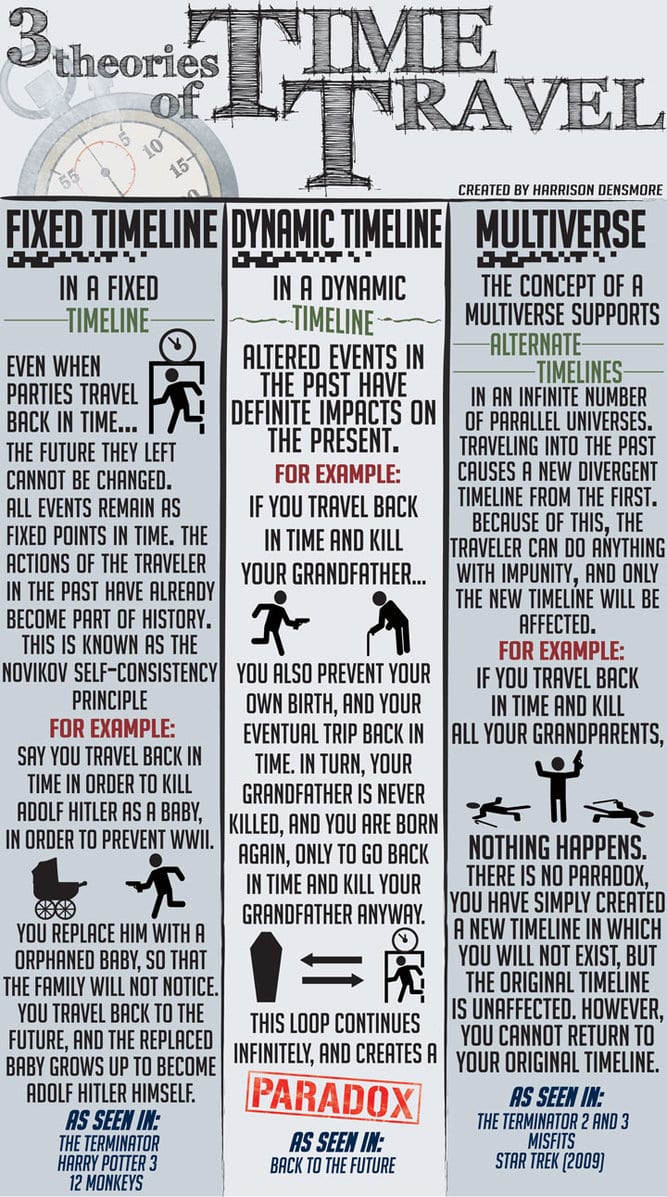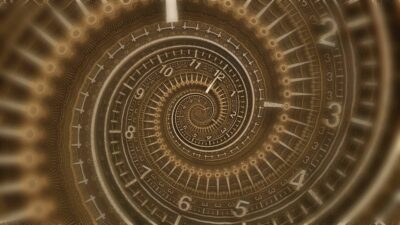Time travel is one of the most popular themes in cinema. Although most time travel movies are in the sci-fi genre, every genre, even comedy, horror, and drama, have tackled complicated storylines involving time travel theory. Chances are, you’ve seen at least a few of the movies listed below:
- Bill & Ted’s Excellent Adventure (1989)
- The Time Machine (2002)
- Timeline (2003)
- Time Cop (2004)
- Back to the Future (1985)
- 12 Monkeys (1995)
- Terminator Series (1984)
- Star Trek (2009)
- Harry Potter and the Prisoner of Azkaban (2004)
- Freejack (1992)
- Looper (2012)
But one thing you might not have realized, even if you’ve seen hundreds of time travel-related films, is that there are only 3 different theories of time travel. That’s it. Every time travel movie or book that you’ve ever enjoyed falls into one of these time travel theories.
There are only 3 different theories of #TimeTravel. Every time travel example falls into one of these time travel theories. #FixedTimeline #DynamicTimeline #Multiverse #GrandfatherParadox #TimeTravel #timeline Share on XFixed Timeline: Time Travel Theory
Want to change the future on Earth by modifying the past or present? Don’t even bother according to this time travel theory. In a fixed timeline, there’s a single history that is unchangeable. Whatever you are attempting to change by time-traveling is what created the problems in the present that you’re trying to fix (12 Monkeys). Or you’re just wasting your time because the events you are trying to prevent will happen anyway (Donnie Darko).
Dynamic Timeline: Time Travel Theory
History is fragile and even the smallest changes can have a huge impact. After traveling back in time, your actions may impact your own timeline. The result is a paradox. Your changes to the past might result in you never being born, like in Back to the Future (1985), or never traveling in time in the first place. In The Time Machine (2002), Hartdegen goes back in time to save his sweetheart Emma but can’t. Doing so would have resulted in his never developing the time machine that he used to try and save her.
One common way to explore this paradox theory is by killing your own grandfather. The grandfather paradox is when a time traveler attempts to kill their grandfather before the grandfather meets their grandmother. This prevents the time travel’s parents from being born and thus the time traveler himself from being born. But if the time traveler was never born, then the traveler would never have traveled back in time, therefore erasing his or her actions involving the death of their grandfather.
Multiverse: Time Travel Theory
Travel all over time and do whatever you want. It doesn’t matter because there are multiple universes and your actions only create new timelines. This is a common theory used by the science fiction TV series, Doctor Who. Using the multiverse theory of time travel, it’s assumed that there are multiple coexisting alternate timelines.
Therefore, when the traveler goes back in time, they end up in a new timeline where historical events can differ from the timeline they came from, but their original timeline does not cease to exist. This means the grandfather paradox can be avoided. Even if the time traveler’s grandparent is killed at a young age in the new timeline, he/she still survived to have children in the original timeline, so there is still a causal explanation for the traveler’s existence.
Time travel may actually create a new timeline that diverges from the original timeline at the moment the time traveler appears in the past, or the traveler may arrive in an already existing parallel universe. There’s just one problem… you can’t go back (The One, 2002).
But what about…
Some may argue that people who are “trapped” in time are time travelers as well. This happens in countless time travel movies including Robin Williams‘ character in the 1995 film Jumanji who gets trapped inside a board game. The list of “people who are cryogenically frozen and then successfully thawed out in the future” is even longer and includes Austin Powers: The Spy Who Shagged Me (1999), Planet of the Apes (1968) and so on.
Although these characters are “moving” through time, they are doing so by pausing and then rejoining the current timeline. The lack of a time machine device disqualifies them from technically being “time travelers” and included in this list of theories on time travel.
The Possibility Of Time Travel
So will time travel ever be possible? All we know for sure is that the experts don’t agree. According to the Albert Einstein theory of relativity, time is relative, not constant and the bending of spacetime could be possible. But according to Stephen Hawking, time travel is not possible. The Stephen Hawking time travel theory suggests that the absence of present-day time travelers from the future is an argument against the existence of time travel — a variant of the Fermi paradox (aka where the hell is everybody?). But it’s fun to think about.

NERD NOTE: What happens to time in a black hole? We don’t know for sure, but according to both Stephen Hawking and Albert Einstein’s theory, time near a black hole slows down. This is because a black hole’s gravitational pull is so strong that even light can’t escape. Since gravity also affects light, time would also slow down.
Time Travel Theory
If you could successfully travel into the future, or back in time, what would you do? Warn people about natural disasters? Buy a winning lottery ticket? Try to prevent your own death? What do you think about these time travel theory ideas or the time travel movies that we included in this article? Please tell us in the comments below.
Time Travel Theory: Popular Time Travel Theories Explained -- Can You Prove Them Wrong? ... #TimeTravel #TimeTravelTheory #FermiParadox Share on XRelated Articles:
- Beautiful Nature Time-Lapse Videos That Will Brighten Your Day
- Productivity Tips to Help You Focus, Save Time, And Stay Motivated
- Famous People Who Are Members Of The Sleepless Elite
- Should Scientists Clone The Woolly Mammoth?

Frank Wilson is a retired teacher with over 30 years of combined experience in the education, small business technology, and real estate business. He now blogs as a hobby and spends most days tinkering with old computers. Wilson is passionate about tech, enjoys fishing, and loves drinking beer.











 4 Of The Best Crime Movies Filmed In Philadelphia
4 Of The Best Crime Movies Filmed In Philadelphia
are there really only 3 theories? i feel like there are more but i cant think of any besides the movies listed here. hummmmmmmmm